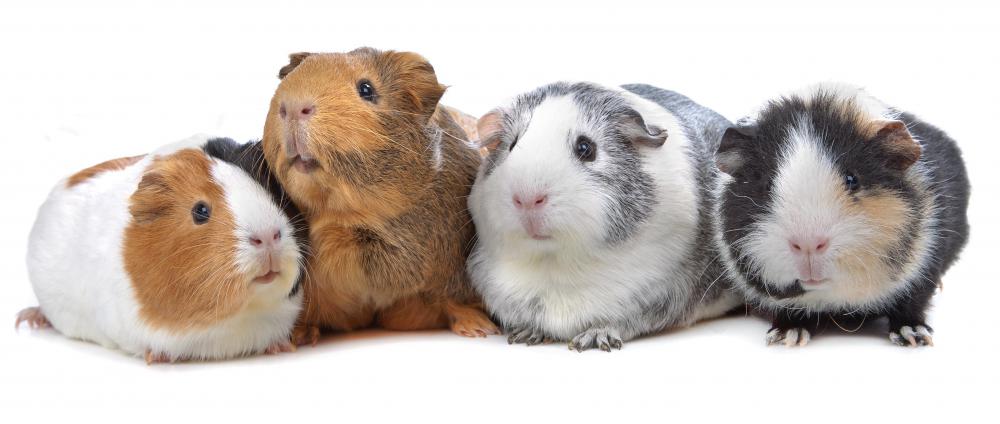At AllThingsNature, we're committed to delivering accurate, trustworthy information. Our expert-authored content is rigorously fact-checked and sourced from credible authorities. Discover how we uphold the highest standards in providing you with reliable knowledge.
What Are the Different Types of Guinea Pig Foods?
Cavia porcellus, commonly known as cavies or guinea pigs, are relatively inexpensive house pets to feed. A guinea pig's diet consists mainly of hay. Commercial guinea pig foods are also recommended, and these usually come in pellet form. Also, a cavy is among a handful of mammals that cannot produce vitamin C, therefore they must also have a food source that contains this nutrient. For this reason, fresh fruits and vegetables are also recommended, but on a limited basis.
Hay is one of the main types of guinea pig foods. There should always be a limitless supply of hay. Not only is guinea pig food, but it also aids digestion and helps keep a guinea pig's teeth from growing too long.

Timothy hay is the recommended type of hay for most guinea pigs. Other types of hay, such as alfalfa hay, may contain too much calcium, which can cause problem for older guinea pigs. Juvenile and pregnant guinea pigs, on the other hand, should be fed a mixture of Timothy hay and alfalfa hay, which will provide the necessary amount of calcium.
These types of guinea pig foods can be purchased from most pet stores. When purchasing hay, however, it is important to make sure that it is not too old. Soft green hay is the most desirable guinea pig food, as opposed to stiff yellow hay.

Other guinea pig foods, including pellets, can also be purchased from most pet stores. Most guinea pig owners give a small handful of these pellets to each guinea pig everyday. If the guinea pig eats all of these pellets and still seems hungry, he can be fed a little more. On the other hand, if a healthy guinea pig leaves most of these pellets, the owner can cut back on the amount of pellets given.

Guinea pigs are naturally deficient in vitamin C, so they are very susceptible to certain illnesses, particularly scurvy. While some commercial guinea pig foods contain vitamin C, fresh vegetables and fruits that are high in vitamin C are recommended to keep this animal healthy. Roughly a handful of vegetables should be fed to a guinea pig each day.
Leafy greens are an excellent source of vitamin C, particularly Romaine and red leaf lettuce. Tomatoes and green peppers are also rich in this nutrient. Certain fruits, such as oranges and strawberries are also high in vitamin C, but fruits should be fed to a guinea pig sparingly. Many owners choose to use these tasty morsels as occasional treats.
Frequently Asked Questions
What is the best diet for a guinea pig?
A balanced guinea pig diet consists primarily of high-quality hay, which should be available at all times to aid in digestion and dental health. Fresh vegetables, particularly leafy greens like romaine lettuce and kale, should be provided daily. A small portion of specially formulated guinea pig pellets can supplement their diet, ensuring they get enough Vitamin C, which they cannot produce on their own. Fresh, clean water must always be accessible.
How much fresh produce should I feed my guinea pig?
Guinea pigs require about one cup of fresh vegetables per day, with a focus on leafy greens. Introduce new vegetables gradually to avoid digestive upset. It's important to balance the types of vegetables to prevent nutritional imbalances. For example, too much calcium from certain greens can lead to bladder stones, so variety is key. Always wash produce thoroughly to remove pesticides and cut into appropriate sizes to prevent choking.
Can guinea pigs eat fruits, and if so, which ones are safe?
Guinea pigs can eat fruits in moderation due to their high sugar content; think of fruits as a treat rather than a staple. Safe options include apples (without seeds), pears, strawberries, and blueberries. Limit fruit servings to a few small pieces once or twice a week to prevent diabetes and obesity. Always introduce new fruits slowly to monitor for any adverse reactions.
Are there any foods that are toxic to guinea pigs?
Yes, certain foods are toxic to guinea pigs and should be avoided. These include anything from the allium family such as onions, garlic, and leeks, which can cause blood disorders. Also, avoid feeding them potatoes, mushrooms, and rhubarb due to potential toxicity. Chocolate, caffeine, and dairy products are also harmful and should never be given to guinea pigs.
How important is Vitamin C for guinea pigs, and how can I ensure they're getting enough?
Vitamin C is crucial for guinea pigs as they cannot synthesize it themselves. A deficiency can lead to scurvy, which is a serious health condition. Ensure they receive enough Vitamin C through fresh vegetables like bell peppers and leafy greens, as well as through fortified guinea pig pellets. Some caregivers opt to provide a Vitamin C supplement, but this should be done under veterinary guidance to avoid overdose.
What type of hay is best for guinea pigs, and why?
Timothy hay is the best choice for guinea pigs due to its optimal fiber content, which is essential for their digestive health and dental wear. It should make up the bulk of their diet. Avoid alfalfa hay for adult guinea pigs as it's high in calcium, which can lead to urinary problems. For young, pregnant, or nursing guinea pigs, alfalfa hay can be beneficial due to its higher calorie and protein content.
AS FEATURED ON:
AS FEATURED ON:













Discuss this Article
Post your comments